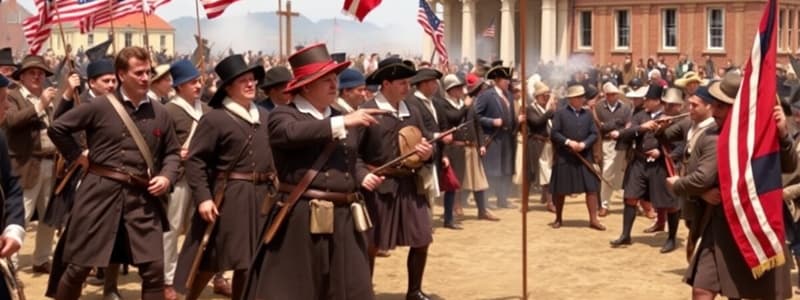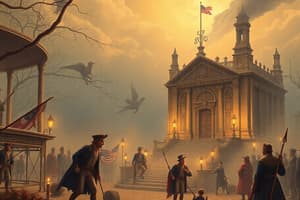Podcast
Questions and Answers
What is the term used for the refusal to comply with certain laws or pay taxes as a form of protest?
What is the term used for the refusal to comply with certain laws or pay taxes as a form of protest?
- Civil Disobedience (correct)
- Diplomacy
- Tyranny
- Boycott
Which term describes individual rights protected by law from interference?
Which term describes individual rights protected by law from interference?
- Civil Liberties (correct)
- Quartering
- MinuteMen
- Loyalist
What does the term 'boycott' mean?
What does the term 'boycott' mean?
- To support a country's products
- To protest by stopping the purchase of goods (correct)
- To negotiate treaties with other nations
- To enlist soldiers for military service
Who were the Loyalists during the American Revolution?
Who were the Loyalists during the American Revolution?
What is meant by 'unalienable rights'?
What is meant by 'unalienable rights'?
What was a consequence of the Boston Tea Party?
What was a consequence of the Boston Tea Party?
Which act required colonists to house British soldiers?
Which act required colonists to house British soldiers?
What was one of the direct taxes imposed on the colonies?
What was one of the direct taxes imposed on the colonies?
What event highlighted colonial grievances against British rule?
What event highlighted colonial grievances against British rule?
What was one of the significant causes of colonial unrest prior to the American Revolution?
What was one of the significant causes of colonial unrest prior to the American Revolution?
What was one of the main causes of the French and Indian War?
What was one of the main causes of the French and Indian War?
What was one significant impact of the French and Indian War on England?
What was one significant impact of the French and Indian War on England?
What remained unresolved after the French and Indian War?
What remained unresolved after the French and Indian War?
Which nation had the highest rank concerning territorial claims after the French and Indian War?
Which nation had the highest rank concerning territorial claims after the French and Indian War?
What effect did the French and Indian War have on Native Americans?
What effect did the French and Indian War have on Native Americans?
What was taxed under the Sugar Act?
What was taxed under the Sugar Act?
What was a common reaction of colonists to the Stamp Act?
What was a common reaction of colonists to the Stamp Act?
What did the Quartering Act state?
What did the Quartering Act state?
What was taxed under the Townshend Act?
What was taxed under the Townshend Act?
What was the consequence faced by England due to the colonist reaction to the Stamp Act?
What was the consequence faced by England due to the colonist reaction to the Stamp Act?
What was the primary reason for the colonists' meeting at the First Continental Congress?
What was the primary reason for the colonists' meeting at the First Continental Congress?
Which document did the First Continental Congress issue to articulate their grievances?
Which document did the First Continental Congress issue to articulate their grievances?
What action did the Congress agree upon to pressure the British government?
What action did the Congress agree upon to pressure the British government?
What was the perceived action of the colonial leaders by British officials after the Congress meeting?
What was the perceived action of the colonial leaders by British officials after the Congress meeting?
What significant event marked the beginning of the American Revolutionary War?
What significant event marked the beginning of the American Revolutionary War?
What was the purpose of the Boston Port Act?
What was the purpose of the Boston Port Act?
Which act allowed accused individuals to be tried in another colony or Britain?
Which act allowed accused individuals to be tried in another colony or Britain?
What impact did the Coercive Acts have on colonial sentiment?
What impact did the Coercive Acts have on colonial sentiment?
Who was appointed as the military governor of Massachusetts after the passage of the Coercive Acts?
Who was appointed as the military governor of Massachusetts after the passage of the Coercive Acts?
What did the Quebec Act 1774 give to Catholics in Canada that upset colonial Protestants?
What did the Quebec Act 1774 give to Catholics in Canada that upset colonial Protestants?
What is the primary reason colonists want to use violence in the Ohio River Valley?
What is the primary reason colonists want to use violence in the Ohio River Valley?
What was a common method used by colonists to avoid paying import taxes?
What was a common method used by colonists to avoid paying import taxes?
How much did England estimate it would cost annually to maintain the British soldiers in the colonies after the French and Indian War?
How much did England estimate it would cost annually to maintain the British soldiers in the colonies after the French and Indian War?
What was the total cost England incurred due to the French and Indian War?
What was the total cost England incurred due to the French and Indian War?
What sentiment did colonists have towards the presence of British troops in the 13 Colonies?
What sentiment did colonists have towards the presence of British troops in the 13 Colonies?
Which problem led to a disagreement about land ownership between colonists?
Which problem led to a disagreement about land ownership between colonists?
How did the colonists react to Parliament's insistence that they should pay taxes for the war?
How did the colonists react to Parliament's insistence that they should pay taxes for the war?
Which action did colonists take frequently in order to avoid British trade regulations?
Which action did colonists take frequently in order to avoid British trade regulations?
What was the main reason the colonists protested the tax on tea?
What was the main reason the colonists protested the tax on tea?
What was the purpose of the Tea Act of 1773?
What was the purpose of the Tea Act of 1773?
What group demanded that the tea ships leave Boston Harbor?
What group demanded that the tea ships leave Boston Harbor?
How many chests of tea were dumped into Boston Harbor during the Boston Tea Party?
How many chests of tea were dumped into Boston Harbor during the Boston Tea Party?
What was the estimated monetary loss from the Boston Tea Party in today's terms?
What was the estimated monetary loss from the Boston Tea Party in today's terms?
What was the name of the punitive acts passed by Parliament in response to the Boston Tea Party?
What was the name of the punitive acts passed by Parliament in response to the Boston Tea Party?
What was the colonial response to the British East India Company's direct sale of tea?
What was the colonial response to the British East India Company's direct sale of tea?
Which group disguised themselves as Mohawk Native Americans during the Boston Tea Party?
Which group disguised themselves as Mohawk Native Americans during the Boston Tea Party?
Flashcards
Boycott
Boycott
Refusing to buy goods or services as a protest.
Civil Liberties
Civil Liberties
Individual rights protected from government interference.
Quartering
Quartering
Providing lodging, especially for soldiers.
Tyranny
Tyranny
Signup and view all the flashcards
Tax
Tax
Signup and view all the flashcards
French and Indian War Cost
French and Indian War Cost
Signup and view all the flashcards
Proclamation of 1763
Proclamation of 1763
Signup and view all the flashcards
Direct Taxes
Direct Taxes
Signup and view all the flashcards
Boston Tea Party
Boston Tea Party
Signup and view all the flashcards
Intolerable Acts
Intolerable Acts
Signup and view all the flashcards
French & Indian War Cause
French & Indian War Cause
Signup and view all the flashcards
War's Impact on Colonies?
War's Impact on Colonies?
Signup and view all the flashcards
French & Indian War Effect: Debt
French & Indian War Effect: Debt
Signup and view all the flashcards
Ohio River Valley: Before & After War
Ohio River Valley: Before & After War
Signup and view all the flashcards
Native Americans & Colonists
Native Americans & Colonists
Signup and view all the flashcards
Western Land Disputes
Western Land Disputes
Signup and view all the flashcards
Smuggling in the Colonies
Smuggling in the Colonies
Signup and view all the flashcards
Cost of Defense
Cost of Defense
Signup and view all the flashcards
Colonial Tax Resistance
Colonial Tax Resistance
Signup and view all the flashcards
Navigation Acts
Navigation Acts
Signup and view all the flashcards
British Financial Burden
British Financial Burden
Signup and view all the flashcards
Colonial Self-Governance
Colonial Self-Governance
Signup and view all the flashcards
Impact of the War
Impact of the War
Signup and view all the flashcards
Sugar Act
Sugar Act
Signup and view all the flashcards
Stamp Act
Stamp Act
Signup and view all the flashcards
Quartering Act
Quartering Act
Signup and view all the flashcards
Townshend Acts
Townshend Acts
Signup and view all the flashcards
Writs of Assistance
Writs of Assistance
Signup and view all the flashcards
First Continental Congress
First Continental Congress
Signup and view all the flashcards
Declaration and Resolves
Declaration and Resolves
Signup and view all the flashcards
Boycott of British Goods
Boycott of British Goods
Signup and view all the flashcards
Lexington and Concord
Lexington and Concord
Signup and view all the flashcards
Coercive Acts
Coercive Acts
Signup and view all the flashcards
Boston Port Act
Boston Port Act
Signup and view all the flashcards
Massachusetts Government Act
Massachusetts Government Act
Signup and view all the flashcards
Act for Impartial Administration of Justice
Act for Impartial Administration of Justice
Signup and view all the flashcards
Quartering Act 1774
Quartering Act 1774
Signup and view all the flashcards
What was the Tea Act of 1773?
What was the Tea Act of 1773?
Signup and view all the flashcards
What was the colonists' main objection to the Tea Act?
What was the colonists' main objection to the Tea Act?
Signup and view all the flashcards
Why did colonists disguise themselves as Mohawk Native Americans?
Why did colonists disguise themselves as Mohawk Native Americans?
Signup and view all the flashcards
What were the Intolerable Acts?
What were the Intolerable Acts?
Signup and view all the flashcards
What was the impact of the Boston Tea Party?
What was the impact of the Boston Tea Party?
Signup and view all the flashcards
Sons of Liberty
Sons of Liberty
Signup and view all the flashcards
What was the British East India Company's role?
What was the British East India Company's role?
Signup and view all the flashcards
How did the Boston Tea Party impact the relationship between Britain and the colonies?
How did the Boston Tea Party impact the relationship between Britain and the colonies?
Signup and view all the flashcards




